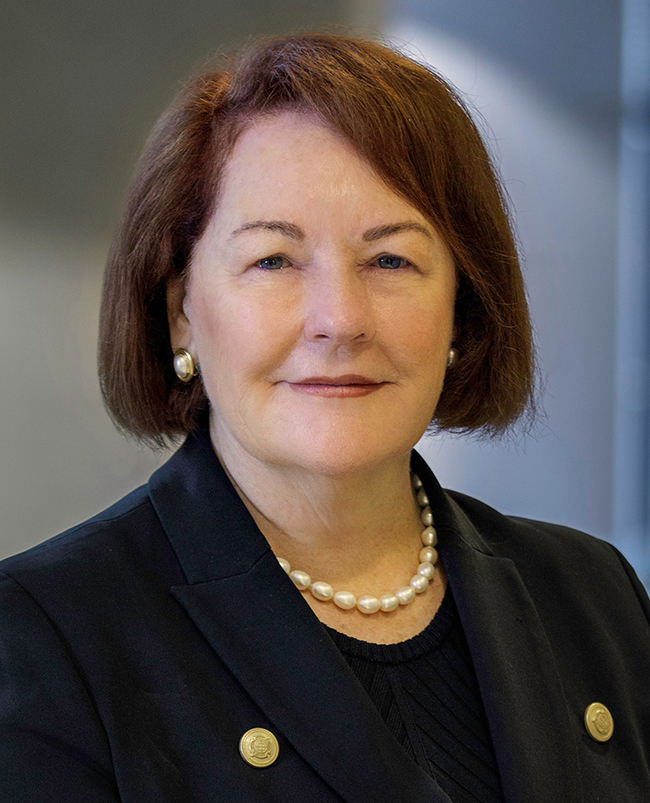Payments System Board Annual Report – 20241. About the Payments System Board
The Payments System Board has responsibility for the RBA’s payments system policy, including policy on clearing and settlement facilities. In 2023/24, the Board comprised eight members and met at the RBA Head Office through the year. During the year, it set five strategic priorities to guide the RBA’s payments policy work, strengthened its code of conduct and its conflict of interest policy, and ensured a high degree of transparency and accountability around its actions through reporting and the RBA’s communication program.
Role of the Board and the RBA
The Reserve Bank of Australia (RBA) is responsible for promoting the stability, efficiency and competitiveness of the payments system through the Payments System Board. The Board has a duty under the Reserve Bank Act 1959 to ensure that the RBA’s payments system policy is directed to the greatest advantage of the people of Australia, and that the powers of the RBA under the Payment Systems (Regulation) Act 1998 and the Payment Systems and Netting Act 1998 are exercised in a way that, in the Board’s opinion, will best contribute to:
- controlling risk in the financial system
- promoting the efficiency of the payments system
- promoting competition in the market for payment services, consistent with the overall stability of the financial system.
Under the Payment Systems (Regulation) Act, the RBA has the power to designate payment systems and to set standards and access regimes for designated systems. The Payment Systems and Netting Act provides the RBA with the power to give legal certainty to certain settlement arrangements to minimise the risks of systemic disruptions from payment systems.
In addition, the Board has a duty to ensure that the powers and functions of the RBA under Part 7.3 of the Corporations Act 2001 are exercised in a way that, in the Board’s opinion, will best contribute to the overall stability of the financial system. These powers and functions relate to the supervision of central counterparties (CCPs) and securities settlement facilities (SSFs), which are key infrastructure supporting the clearing and settlement of transactions in financial markets. The RBA’s Payments Policy Department also acts as overseer of Australia’s high-value payments system – the Reserve Bank Information and Transfer System (RITS).

Strategic priorities
The Payments System Board periodically sets strategic priorities to guide the RBA’s payments policy work. At its August 2023 meeting, the Board agreed on five strategic priorities, outlined below, which focus on:
- developments in the payments system that could have significant implications for competition, efficiency and safety over the next few years
- issues affecting payments and market infrastructures and their implications for financial stability.
The Board will review the strategic priorities as the payments landscape evolves and in the context of its broader powers.
Strengthen the resilience of payments and market infrastructures

Payments and market infrastructures play a crucial role in facilitating payments and financial risk management. The reliance of the economy and financial system on their services means that disruptions can have wide-reaching effects. The RBA is focused on ensuring these risks to payments and market infrastructures are managed appropriately. To achieve this, the RBA has:
- required market infrastructures to prioritise the management of aging infrastructure and adopt replacements and upgrades in a safe manner
- established a risk-based framework for the oversight of key retail payment systems
- required payments and market infrastructures to further uplift their cyber resilience with clearly defined cyber strategies and rigorous cyber-testing programs.
Advance and implement reforms for payments and market infrastructures

The Australian Government is modernising the regulatory frameworks for payments and market infrastructures. To advance and implement these reforms, the RBA has:
- assisted the government to develop legislation for regulating payments and market infrastructures
- prepared to conduct the Review of Retail Payments Regulation under a modernised Payment Systems (Regulation) Act.
Promote competitive, cost-effective and accessible electronic payments

Consumers and businesses are relying on electronic means of payment more than ever before. The RBA has an important role to play in promoting a payments system that delivers competitive, cost-effective and accessible electronic payments for consumers and businesses. To achieve this, the RBA has:
- reduced payment costs for small businesses by requiring industry to deliver merchant choice of debit card network
- encouraged industry to deliver and promote additional fast payment capabilities to end users
- modernised the retail payments statistics collected and published by the RBA to account for new technologies and business models.
Enhance cross-border payments

The RBA is supporting international work under the G20 to make cross-border payments cheaper, faster, more transparent and more inclusive. The RBA has a key role to play in promoting priority initiatives in the Australian market that will, over time, help deliver better outcomes for Australian customers. To achieve this, the RBA has:
- contributed to implementing the G20 roadmap to enhance cross-border payments
- explored interlinking the NPP to fast payment systems in other jurisdictions.
Shape the future of money

Australians need safe, efficient and cost-effective payment options, both now and in the future. As the payments landscape changes, the RBA is helping to shape the future of money by exploring the case for new digital forms of currency, and by ensuring cash remains a viable means of payment for those who need or want it. To achieve this, the RBA has:
- conducted research on whether a policy case for a CBDC exists
- supported innovation and resilience in wholesale digital payments
- supported access to physical cash.
Board members as at September 2024
The Payments System Board comprises up to eight members: the RBA Governor; a representative of the RBA (currently the Assistant Governor, Financial System); a representative of the Australian Prudential Regulation Authority (APRA) (currently the Chair of APRA); and up to five other non-executive members appointed by the Treasurer.
Members of the Board as at September 2024 and details of their qualifications and experience are given below.
During the year, Philip Lowe retired from the Board.
Michele Bullock
BEc (Hons) (UNE), MSc (LSE)

Chair and RBA Governor
Governor since 18 September 2023
Present term ends 17 September 2030
Michele Bullock commenced as RBA Governor on 18 September 2023. She is also Chair of the Reserve Bank Board, the Payments System Board and the Council of Financial Regulators.
Prior to her current role, Ms Bullock was the RBA Deputy Governor. She has also held a variety of senior management positions at the RBA. She was Assistant Governor (Financial System), Assistant Governor (Business Services), Assistant Governor (Currency), Adviser for the Currency Group and, before that, Head of Payments Policy Department.
Ms Bullock is a member of Chief Executive Women and a signatory to the Banking and Finance Oath.
Other roles
Chair – Reserve Bank Board
Chair – Council of Financial Regulators
Chair – Financial Markets Foundation for Children
Member – Financial Stability Board
Member – Trans-Tasman Council on Banking Supervision
Director – The Anika Foundation
Brad Jones
PhD (Macquarie)

Deputy Chair and RBA Assistant Governor (Financial System)
Deputy Chair since 16 January 2024
Brad Jones joined the RBA in 2018 and was appointed RBA Assistant Governor (Financial System) in 2022.
Prior to his current role, Dr Jones was the Head of International Department and then the Head of Economic Analysis Department.
Before joining the RBA, Dr Jones held roles at the International Monetary Fund in Washington DC, Deutsche Bank in London and Hong Kong, and the University of Cambridge Judge Business School.
Dr Jones is a Graduate member of the Australian Institute of Company Directors, holds the Chartered Alternative Investment Analyst designation and is a signatory to the Banking and Finance Oath.
Other roles
Member – Basel Committee on Banking Supervision
Member – Council of Financial Regulators
Member – Financial Stability Board Standing Committee on Assessment of Vulnerabilities
Member – Institute of Global Finance Advisory Board
Chair – RBA Financial Market Infrastructure Review Committee
Ross Buckley
BEcon, LLB (Hons) (UQ), PhD (UNSW), LLD (Melbourne)

Non-executive member
Member since 1 August 2023
Present term ends 31 July 2028
Ross Buckley is a Scientia Professor at the University of New South Wales and an Australian Research Council Laureate Fellow. His key research areas include fintech, regtech, central bank digital currencies and cryptoassets more generally. He has written seven books and over 200 journal articles, book chapters and major reports. He has twice been a Fulbright Scholar, at Yale and Duke universities.
Professor Buckley has consulted to government departments in over a dozen countries and written reports for a range of institutions, including the Alliance for Financial Inclusion, Asian Development Bank, Bank for International Settlements, European Commission and the United Nations Capital Development Fund.
Other roles
Chair – Digital Finance Advisory Panel, Australian Securities and Investments Commission
Member
– Consultative Panel, Australian Securities and Investments Commission
Strategic Research
Advisor – Digital Finance Cooperative Research Centre
Fellow and Academic Member –
European Banking Institute, Frankfurt
Fellow –Salzburg Global Finance Forum
Gina Cass-Gottlieb
BEc (Hons), LLB (Hons) (Sydney), LLM (Berkeley)

Non-executive member
Member from 15 July 2013 to 14 July 2018
Reappointed from 1 August 2018
Present term
ends 31 July 2028
Gina Cass-Gottlieb has extensive expertise in competition law and economic regulatory advice and in the regulation of payments in Australia. She was appointed Chair, Australian Competition and Consumer Commission on 21 March 2022.
Prior to this, Ms Cass-Gottlieb was a senior partner in Gilbert + Tobin’s competition and regulation practice, advising and representing corporations, industry associations, government and non-government agencies. She has over 25 years’ experience, including advising in relation to access arrangements in a range of sectors across the economy.
Ms Cass-Gottlieb attended the University of California, Berkeley, as a Fulbright Scholar.
Michelle Deaker
BSc (Hons) (Sydney), MSc (Sydney), PhD (UC)

Non-executive member
Member since 1 August 2023
Present term ends 31 July 2028
Michelle Deaker is a Founding Partner and the Managing Director of OneVentures, a venture capital firm that focuses on technology and healthcare sectors. Dr Deaker has over 20 years’ experience in the development of high-growth technology companies in Australia and the United States. She has served on the boards of large and small listed and unlisted companies and has a strong background in Australian research and development as well as expertise in global business expansion.
Prior to establishing OneVentures in late 2006, Dr Deaker established IT enterprise business Networks Beyond 2000 and later E Com Industries, a leading prepaid card and electronic voucher provider in several countries.
Dr Deaker is a member of the Australian Institute of Company Directors and Chief Executive Women.
Other roles
Director – Phocas Group
Director – Buildkite
Director – WinVC Limited
Board
Observer – Employment Hero
Scott Farrell
BEc (Sydney), LLB (Hons) (Sydney), PhD (UNSW)

Non-executive member
Member since 23 March 2022
Present term ends 22 March 2027
Scott Farrell has more than 25 years’ experience in financial markets and financial systems law. In 2016, he was appointed to the Australian Government’s FinTech Advisory Group at its formation and in 2018 was appointed its co-Chair.
Dr Farrell has led a number of reviews for the Australian Government, including the Review into Open Banking in Australia in 2017, the Inquiry into Future Directions for the Consumer Data Right in 2020 and the Review of the Australian Payments System in 2021.
Other roles
Strategic Counsel – King & Wood Mallesons
Adjunct Professor – School of Private and
Commercial Law, University of New South Wales
Chair – International Standards Organisation TC
307 Blockchain and Distributed Ledger Technologies
John Lonsdale

APRA-appointed member
Chair – Australian Prudential Regulation Authority
Member since 1 November 2022
John Lonsdale was appointed as Chair of the Australian Prudential Regulation Authority (APRA) on 31 October 2022 after joining APRA as Deputy Chair on 8 October 2018. In his Deputy Chair role, Mr Lonsdale was responsible for oversight of Australia’s banking sector, as well as oversight of APRA’s work on culture and remuneration, building APRA’s crisis-resolution capability and strengthening APRA’s collaboration with peer regulators.
Prior to joining APRA, Mr Lonsdale worked for the Australian Treasury for over 30 years. He was a member of the Treasury’s Executive and, in his role as Deputy Secretary for the Markets Group, he had responsibility for financial system, consumer and foreign investment policy. In 2014 he led the Secretariat for the Financial System Inquiry.
Other roles
Member – Council of Financial Regulators
Member – Financial Stability Board Standing
Committee on Supervisory and Regulatory Cooperation
Member – Trans-Tasman Council on Banking
Supervision
Deborah Ralston
BEc, Dip Fin Mgt, MEc (UNE), PhD (Bond)

Non-executive member
Member since 15 December 2016
Present term ends 14 December 2026
Deborah Ralston has more than 25 years of board-level experience in education, banking, superannuation and fintech sectors. She has held senior leadership and research roles in Australian universities, most recently as the Executive Director of the Centre for Financial Studies.
Dr Ralston’s expertise in public policy is reflected in appointments to the Australian Government’s Retirement Income Review Panel, the Comprehensive Income Products for Retirement Framework Advisory Committee and as inaugural Chair of the Australian Securities and Investments Commission’s Digital Finance Advisory Board.
Dr Ralston is currently a Professorial Fellow at Monash University Business School, with research interests in financial regulation and superannuation. She is a Fellow of CPA Australia and the Australian Institute of Company Directors.
Other roles
Chair – Advisory Board, Household Capital
Director – SMSF Association
Member –
Advisory Board, Connexus Institute
Member – Future Fund Board of Guardians
Retirement from the Board
Philip Lowe retired from the Payments System Board on 17 September 2023.
Philip Lowe
BCom (Hons) (UNSW), PhD (MIT)

Chair and RBA Governor
RBA Governor from 18 September 2016 to 17 September 2023
Philip Lowe’s appointment as RBA Governor took effect in September 2016.
Prior to that, he held various senior positions at the RBA, including Assistant Governor (Financial System), Assistant Governor (Economic) and Deputy Governor.
Mr Lowe spent two years at the Bank for International Settlements working on financial stability issues. He has authored numerous papers, including on the linkages between monetary policy and financial stability. The University of New South Wales awarded Mr Lowe the Chancellor’s Award for Exceptional Alumni Achievement in June 2021 and a Doctor of Business, honoris causa (Hon.DBus) in May 2024. Mr Lowe is a signatory to the Banking and Finance Oath.
Other roles
Chair – Reserve Bank Board
Chair – Council of Financial Regulators
Chair – Bank
for International Settlements Committee on the Global Financial System
Chair – Financial Markets
Foundation for Children
Member – Financial Stability Board
Member – Trans-Tasman
Council on Banking Supervision
Director – The Anika Foundation
Resolution passed by the Payments System Board – 17 August 2023
On the occasion of Philip Lowe’s final meeting after seven years as Governor and Chair of the Board, members expressed their appreciation for his exceptional contribution to the RBA’s work on payments policy matters in Australia for two decades and to the Board’s deliberations in continuing to meet its mandate for efficiency, competition and controlling risk in the payments system. On behalf of all members, the Governor-designate, Michele Bullock, paid tribute to Mr Lowe’s exemplary leadership of the Board and the RBA during a period of significant change, growing sophistication and challenges in the payments area. Members warmly recorded their appreciation of Mr Lowe’s dedication to public policy in a career spanning more than four decades. They thanked him for his service to the RBA and the nation and wished him well in the future.
Meetings of the Board
The Payments System Board met four times in 2023/24. Meetings were all in person and held at the RBA Head Office in Sydney. Five members form a quorum at a meeting of the Board; five members are also required to pass a resolution without a meeting. Table 1.1 sets out meeting attendance by members during the year.
| Member | Role | Term | No. of meetings attended | No. of meetings eligible to attend | |
|---|---|---|---|---|---|
| Philip Lowe | Chair; RBA Governor | Sep 2016 – Sep 2023 | 1 | 1 | |
| Michele Bullock(a) | Chair; RBA Governor | Sep 2023 – Sep 2030 | 4 | 4 | |
| Brad Jones | Deputy Chair | Jan 2024 – | 2 | 2 | |
| John Lonsdale | APRA representative | Nov 2022 – | 3 | 3 | |
| Ross Buckley | Non-executive member | Aug 2023 – Jul 2028 | 4 | 4 | |
| Gina Cass-Gottlieb | Non-executive member | Jul 2013 – Aug 2028(b) | 3 | 4 | |
| Michelle Deaker | Non-executive member | Aug 2023 – Jul 2028 | 4 | 4 | |
| Scott Farrell | Non-executive member | Mar 2022 – Mar 2027 | 4 | 4 | |
| Deborah Ralston | Non-executive member | Dec 2016 – Dec 2026 | 4 | 4 | |
|
(a) Michele Bullock’s term on the Board as Deputy Chair ended on
17 September 2023 and she commenced as Chair (RBA Governor) on 18 September 2023.
Source: RBA. |
|||||

Source: RBA.
Code of conduct
A code of conduct for Payments System Board members supplements statutory requirements and imposes obligations on members to ensure the highest possible standards of ethical conduct. At its November 2023 meeting, the Board agreed to strengthen arrangements to manage members’ actual or perceived conflicts of interest. This included introducing a prohibition on active trading in financial instruments of potentially regulated institutions and introducing a ‘blackout period’, during which members and associated entities are prohibited from conducting any transactions in financial instruments of potentially regulated institutions. The code is published on the RBA website.[1]
Conflicts of interest
The RBA has several distinct areas of responsibility in the Australian payments system. It:
- owns, operates and participates in Australia’s real-time gross settlement (RTGS) system – RITS
- provides transactional banking services to the Australian Government and its agencies
- is principal regulator of the payments system through the Payments System Board.
This combination of functions is conventional internationally, but their existence in the one institution may give rise to concerns about conflicts of interest. In view of this, the Board has adopted a policy on managing actual or perceived conflicts of interests, which focuses on the interactions between the RBA’s Payments Policy and Banking departments. The policy is published on the RBA website.[2]
Details of the steps taken to achieve compliance with the policy, including the minutes of informal meetings between departments, are audited regularly, with the results presented to the Board.
In November 2023, the Board amended the policy to allow staff from the Payments Policy and Banking departments to collaborate on work related to the winding down of the cheques system. The amendment allows the RBA to better support the government in its objective of achieving an orderly closure of the cheques system in the public interest.
The Board also has a governance role in managing conflicts of interest relating to the RBA’s oversight of RITS. While an internal Financial Market Infrastructure Review Committee has the formal responsibility to review and approve assessments of other payments and market infrastructures, the Board retains primary responsibility for approving the staff’s periodic assessments of RITS.
Accountability and communication
The Payments System Board seeks to ensure a high degree of transparency and accountability around its actions through regular reporting to the Australian Government and through the RBA’s communication program.
Accountability
The RBA has a range of reporting obligations that serve to ensure the accountability of the Payments System Board. Under the Reserve Bank Act 1959, the Board is required to:
- inform the government, from time to time, of the RBA’s payments system policy (section 11(1)(b))
- prepare and give to the Treasurer a report that covers certain matters relating to the standards that the RBA determines under section 827D of the Corporations Act 2001 and developments in the clearing and settlement industry that are relevant to Australia’s financial stability (section 25M(1)).
This annual report addresses these requirements and is the primary accountability vehicle for the RBA’s payments system responsibilities. The House of Representatives Standing Committee on Economics holds twice-yearly public hearings at which the RBA presents an opening statement on the economy, financial markets and other matters – including payments system matters – related to the RBA’s operations, and responds to questions from Committee members. These hearings may include discussion of developments in the payments system and the RBA’s payments system policy.
The broader accountability of the RBA includes its obligations under the Public Governance, Performance and Accountability Act 2013. The RBA’s annual report, including the annual performance statement, covers the RBA’s role in the payments system.
Communications
The RBA regularly communicates on payments system issues and its regulatory and oversight work through media releases, speeches, research publications, the RBA website, and community and industry liaison. The RBA also engages in various international forums relating to payments and market infrastructures.
The RBA publishes a media release in the afternoon immediately following each quarterly Payments System Board meeting, outlining matters that were discussed by the Board and foreshadowing any forthcoming documents to be released by the RBA. Media releases also accompany any major announcements following decisions taken by the Board.
During 2023/24, senior RBA staff gave a number of public speeches and participated in discussion panels on various payments system-related topics, including modernising Australia’s payments system, a tokenised future for the Australian financial system and policy issues in online retail payments. Audio files and transcripts of speeches are published on the RBA website.
Submissions and parliamentary appearances
Where appropriate, the RBA makes submissions to parliamentary and federal government committees and inquiries on payments and market infrastructure-related topics. During 2023/24, the RBA made submissions to the Senate Economics Legislation Committee and/or the Australian Treasury on the financial market infrastructure regulatory reforms, the reforms to the Payment Systems (Regulation) Act 1998 and the reforms to the licensing of payment service providers. The RBA also appeared before Senate Economics Legislation Committee hearings regarding the legislative reforms. Copies of the RBA’s submissions can be found on the RBA website.
Research and statistics
To support the RBA’s research and policy work, the RBA collects statistics on retail payments on a monthly basis from financial institutions, card companies and other payments system participants. Data on debit and credit cards, ATM transactions, merchant fees, bulk electronic transfers, NPP transactions and cheques provide insights on how individuals and businesses make and receive payments. These aggregated data are published as part of the statistical tables on the RBA website.
In addition, the results from the latest Consumer Payments Survey, which was conducted in late 2022, were published in a research discussion paper in November 2023.[3]
Liaison activity
The RBA engages with a wide range of stakeholders in Australia and overseas.
During 2023/24, the RBA engaged with a range of participants in the payments industry to discuss policy issues and market developments. A key focus of stakeholder engagement was on the upcoming Review of Retail Payments Regulation.
The RBA’s meetings with stakeholders on retail payments issues over the past year focused on a wide range of issues, including competition in the debit card market, the tokenisation of online card transactions, challenges in cross-border payments, payments system access arrangements, the development of the NPP, initiatives to bolster the security and reliability of retail payments, and the future of cash. RBA staff continued to engage with stakeholders about their obligations under the RBA’s card payments regulations. The RBA also engaged with payments industry participants on technology and innovation, especially on CBDCs and the role of new players in the payments ecosystem.
RBA staff meet regularly with senior staff of the Australian Payments Network (AusPayNet), the main industry body for the payments system, to discuss industry initiatives and developments. These meetings take place consistent with a Memorandum of Understanding (MOU) on liaison arrangements between the two organisations that is published on the RBA website.
RBA staff also meet periodically with counterparts from a range of government agencies, including the Australian Competition and Consumer Commission (ACCC), Australian Prudential Regulation Authority (APRA), Australian Securities and Investments Commission (ASIC), the Australian Transaction Reports and Analysis Centre (AUSTRAC), Treasury and the Attorney-General’s Department as part of the cross-agency forum on payments. An MOU between the ACCC and the RBA sets out an agreed basis for policy coordination, information sharing and liaison between the two agencies.
There was significant engagement with Treasury and other agencies during the past year on issues relating to implementing the government’s reforms to the regulation of the payments system.
NPP is operated by NPP Australia Ltd, a wholly owned subsidiary of Australian Payments Plus (AP+). Staff from the RBA’s Payments Policy Department hold regular meetings with senior staff from AP+ to discuss developments in relation to the NPP as well as the other domestic payments infrastructure operated by AP+ (eftpos and BPAY).
The RBA meets regularly with each clearing and settlement facility (CS facility) it supervises. These meetings cover a wide range of topics, including developments in financial and operational risk management. As ASIC and the RBA have complementary regulatory responsibilities for the supervision of CS facilities, the two agencies coordinate their liaison with these facilities. ASIC and the RBA also liaise with market participants on a range of topics related to clearing and settlement.
The RBA continues to work closely with other agencies of the Council of Financial Regulators (CFR) (and, where relevant, the ACCC) on a number of policy issues. These include the Australian Government’s reforms to the regulatory regime for financial market infrastructures and the introduction of a crisis management regime for CS facilities, competition in clearing and settlement of equities, and cybersecurity.
RBA staff also attend various conferences and seminars on issues related to payments and market infrastructures, in some cases as speakers or panellists.
International engagement
The RBA is a member of the Bank for International Settlements’ (BIS) Committee on Payments and Market Infrastructures (CPMI), which serves as a forum for central banks to monitor and analyse developments in payment, clearing and settlement infrastructures, and the development of relevant international standards. It has members from 28 central banks.
Joint working groups of the CPMI and the International Organization of Securities Commissions (IOSCO) bring together members of these two bodies to coordinate policy work on the regulation of payments and market infrastructures. RBA staff are members of a number of CPMI working groups, including those involved in the international roadmap for enhancing cross-border payments.
The RBA also participates in a Financial Stability Board (FSB) working group on CCP resolution.
During 2023/24, the RBA was Chair of the Executives’ Meeting of East Asia-Pacific Central Banks (EMEAP) Working Group on Payments and Market Infrastructures. This is a regional forum for sharing information and experiences relating to the development, oversight and regulation of payments and market infrastructures.
In addition, the RBA also participates in several multilateral and bilateral arrangements to support its oversight of overseas-based payments and market infrastructures.
Table 1.2 provides details of the RBA’s participation in the international forums relevant to the mandate of the Payments System Board.
| Name of the forum | Organiser/secretariat | Mandate | Membership |
|---|---|---|---|
| Policy-focused forums | |||
| CPMI | BIS | Monitoring and analysing developments in payment, clearing and settlement infrastructures, standard setting. | Central banks. |
| CPMI–IOSCO Steering Group | BIS/IOSCO | Providing operational guidance on joint CPMI–IOSCO work. | CPMI and IOSCO members. |
| CPMI–IOSCO Policy Standing Group | BIS/IOSCO | Developing supervisory policies and guidance. | CPMI and IOSCO members. |
| CPMI–IOSCO Implementation Monitoring Standing Group | BIS/IOSCO | Monitoring of Principles for Financial Market Infrastructures implementation in 28 CPMI–IOSCO jurisdictions. | CPMI and IOSCO members. |
| FMI Cross Border Crisis Management Group | FSB | Development of resolution strategies and operational resolution plans for CCPs. | Representatives from jurisdictions, major international financial institutions and standard-setting bodies. |
| EMEAP Working Group on Payments and Market Infrastructures | RBA (2023/24) | Information and experience sharing on the regulation and oversight of payments and market infrastructures. | East Asia-Pacific central banks. |
| Cooperative oversight forums | |||
| CLS Oversight Committee | Federal Reserve Bank of New York | Cooperative oversight of the CLS. | Central banks representing CLS settlement-eligible currencies. |
| SWIFT Oversight Forum | National Bank of Belgium | Providing input to cooperative oversight of SWIFT exercised by SWIFT Oversight Group (OG). | G10 central banks (OG) and additional central banks. |
| LCH Ltd Supervisory College and Crisis Management Group | Bank of England | Cooperative oversight of LCH Ltd. | Central banks and securities regulatory authorities from jurisdictions where LCH Ltd operates. |
| Multilateral Oversight Group for the Euroclear Bank | National Bank of Belgium | Cooperative oversight of Euroclear Bank. | Central banks from jurisdictions where Euroclear Bank operates. |
|
Source: RBA. |
|||
Endnotes
RBA (2023), ‘Code of Conduct for Payments System Board Members’, November. [1]
RBA (2024), ‘Managing Potential Conflicts of Interest Arising from the Bank’s Commercial Activities’, August. [2]
Livermore T, J Mulqueeney, T Nguyen and B Watson, ‘The Evolution of Consumer Payments in Australia: Results from the 2022 Consumer Payments Survey’, RBA Research Discussion Paper No 023-08. [3]